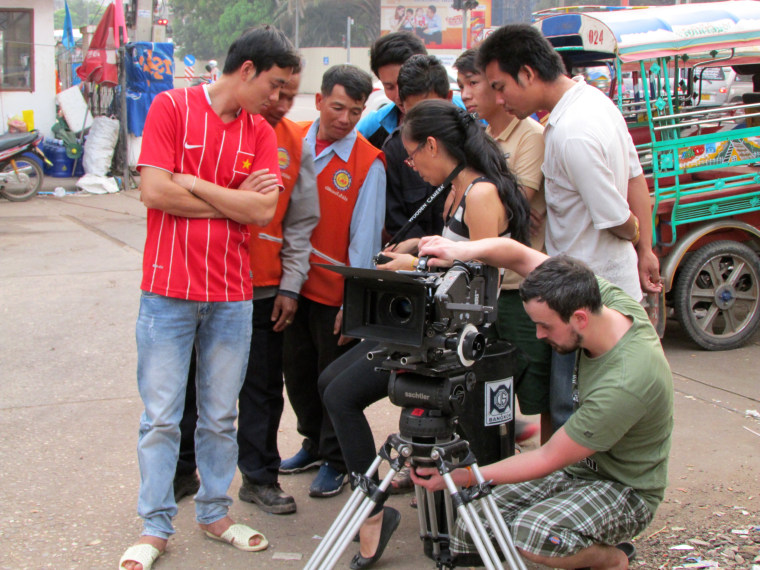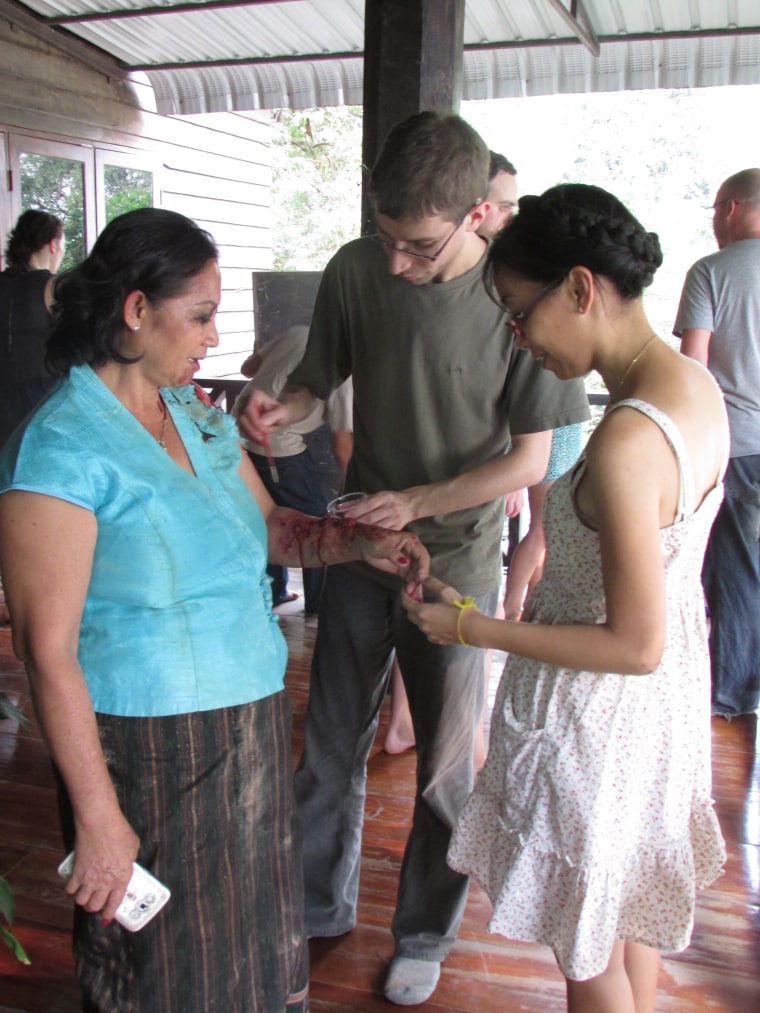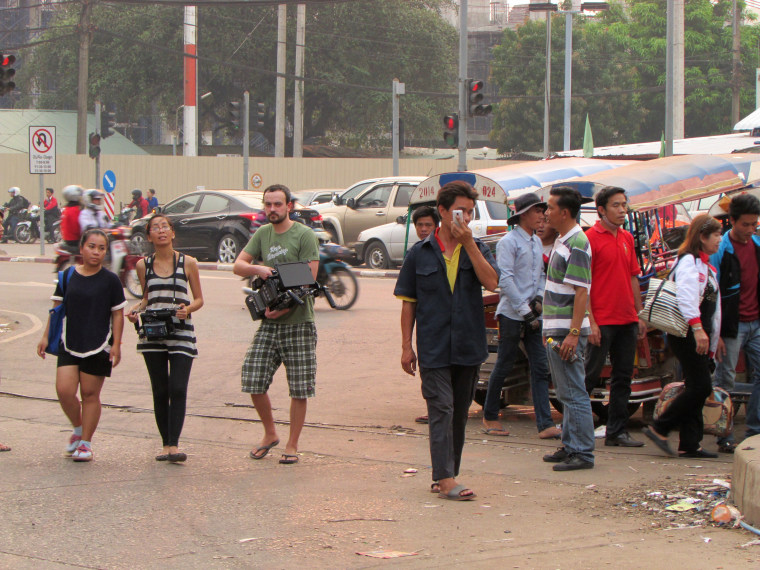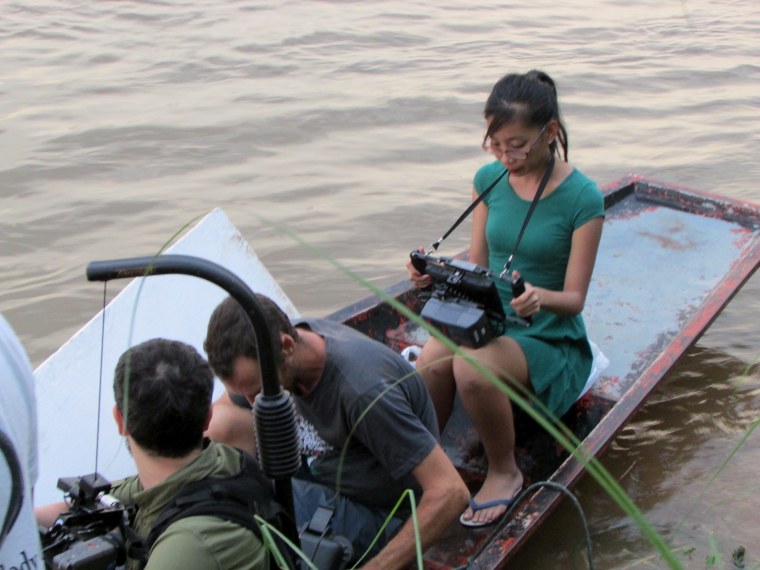Mattie Do never intended on becoming Laos’s first female filmmaker.
In 2010, the former cosmetologist and ballet school director moved to the country’s capital of Vientiane to care for her widower father. Her screenwriter husband, Christopher Larsen, wanted to get involved in the local film scene and asked Do to mediate cultural and language barriers at a meeting with the heads of Lao Art Media, one of few production companies in the country at the time.
“No one had ever really seen a female character that was the star of the film, that carried the entire film on her shoulders, that wasn’t just an appendage to a guy."
Things seemed to be going to be going smoothly until they asked Larsen if he could direct films. He couldn't.
“He’s like, 'Well, she can do it. She speaks Lao.' And I was the only 'she' standing in the room,” Do told NBC News.
Up until that point, she had no formal film education and only limited experience on movie sets as a freelance make-up artist.
When the couple got home — and after what Do said was a lot of yelling — Larsen handed her a textbook he had hung onto from film school. And so began Do’s directing education.
“He said, 'Oh my god, look, you ran a ballet school. You’ve worked with children. That’s not so different from working with actors,'” Do said.
RELATED: From Oprah's 'Super Soul 100' to the White House, Filmmaker Komal Minhas is Lifting Women's Stories
“I just feel like I’m married to a woman who can do anything she decides to do. And sometimes I want a screenwriting job, and what I have to do to get it is trick my wife into becoming the only female film director in Laos,” Larsen told NBC News, laughing.
This thrown-under-the-bus moment led to her first film, 2013's “Chanthaly,” a horror feature about a young middle-class woman who starts seeing visions of her dead mother. It’s the first genre film written and directed in Laos and was partly inspired by the passing of Do’s mother.
According to Do, it’s also the first female-driven film in Laos’s limited cinematic history.
“No one had ever really seen a female character that was the star of the film, that carried the entire film on her shoulders, that wasn’t just an appendage to a guy," she said. "That just cried because he broke her heart or they weren’t getting married."
To date, the country has only produced 13 feature films. Do has made two of them.

Born in Los Angeles to a Vietnamese father and Laotian mother, Do was raised in Merced in California’s Central Valley. After high school, she earned her cosmetology license and eventually made her way to Italy, where her husband was living and working as a screenwriter.
There, she pursued her lifelong dream of studying ballet and worked as a nanny and make-up artist on small film sets to help pay for classes. The latter was the most exposure she had had working in the film industry prior to directing “Chanthaly.”
RELATED: 'We Are More Alike Than We Are Different': Filmmakers Explore Biracial Identities
“When I made 'Chanthaly,' I was able to put in the perspective is of someone who is Lao, ethnically, and someone who is an outsider, nationally. I could take what I observed in this country and behind the closed doors of a Lao family and put it on-screen. And it shocked everyone,” she said.

Do does not shy away from putting taboo aspects of Laotian culture front and center, specifically superstitions. Her insistence on including supernatural elements have led to battles with the Lao Department of Film, which is known to censor projects even in the earliest stages of development.
For “Chanthaly,” the government initially demanded she edit two versions of the film, a Lao version and an international one, she said. Do fought for her vision.
“They were like, 'You know, as Marxists, we don’t believe in the supernatural and afterlife.' And I said, 'Yes, but as Lao people, you do,'” she said.
Ultimately, the department let her cut just one version of the film.
Laotian ghost lore is central to her latest film, 2016's “Dearest Sister,” which incorporates a “lottery ghost” — a belief (also shared among other Asian cultures) that when a family member passes, he or she may communicate winning lottery numbers to the living.
Do had firsthand experience with the cultural quirk when her mother passed and relatives asked her for playable numbers.
"You can Google anybody’s backpacker travel blog about how they put on pajama pants and wore dreadlocks for two weeks and came through the countryside. But I want to show people the side of Laos that I see, the side that is struggling to be relevant."
“The American side of me was ultra-offended, but the Lao side of me understood that this was normal for them, and I cannot judge people because of that. Materialism is a large of part our culture now because [development] is happening so rapidly. It’s something I really wanted to show,” she said.
“Dearest Sister” was partly funded through a crowdfunding campaign and its script was accepted into the Cannes Film Festival's La Fabrique des Cinemas du Monde development program. The film has been screened at film festivals around the world, including Fantastic Fest in Austin, Texas.
She calls her next project a “time travel serial killer sci-fi” film. And while it’s set in rural Laos, she is intent on avoiding what she calls “poverty porn” depictions of Lao life.
“You can Google anybody’s backpacker travel blog about how they put on pajama pants and wore dreadlocks for two weeks and came through the countryside. But I want to show people the side of Laos that I see, the side that is struggling to be relevant,” she said.

She added, “I don’t think that developing countries suffering inadequacies are charming. I don’t think it’s cute or quaint that people are living on dirt roads, and the majority of our population that don’t live in the capital, live in huts.”
By now, Do has spent the majority of her life living abroad, in Europe and Asia, with no immediate plans to move back to the U.S. But she credits her willingness to be bold in her storytelling — despite not having a formal filmmaking education — with being an American of mixed-Asian descent.
“There’s so much about me being American that really adds to the way that I’m able to communicate my stories to other people, the way I’m able to make other people understand what is happening somewhere pretty closed off and relatively unknown,” she said.
Do herself sometimes has trouble fathoming her accidentally groundbreaking career. “I still can’t believe when, at the end of the film, I see my name," she said. “This is a film by Mattie Do. I’m like, “What?'”
